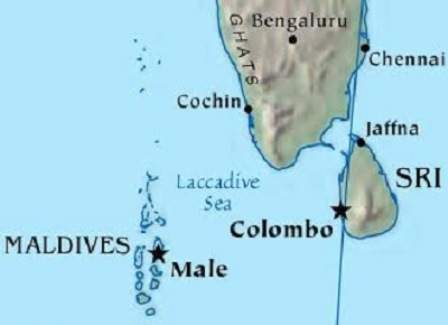Context
India and the Maldives have experienced fluctuating diplomatic relations, but recent actions by India demonstrate a commitment to strengthening ties with its island neighbor. Despite political tensions, India has extended substantial economic support to the Maldives, illustrating a gesture of goodwill.
India's Economic Support and Diplomatic Gesture
Recently, India extended budgetary support of nearly $50 million to the Maldives, showcasing a gesture of goodwill. This move came shortly after a meeting between Maldivian Foreign Minister Moosa Zameer and his Indian counterpart, Dr. S. Jaishankar. Following the meeting, Zameer expressed gratitude for India's prompt response to his request for a debt rollover, as significant repayments to the State Bank of India were imminent.
Additionally, India increased export quotas of essential commodities to the Maldives, including rice, wheat flour, sugar, potatoes, and eggs, as well as construction materials like river sand and stone aggregates. These actions underline India's commitment to supporting the Maldivian economy and its construction industry, which is vital for the nation's development.
Political and Strategic Dynamics
Despite the change in the Maldivian government, India has continued to support multiple infrastructure projects in the country. These include the prestigious Thilamalé sea-bridge and various high-impact development schemes across numerous islands. Maldivian President Muizzu, upon assuming office, maintained the continuity of these projects, underscoring their importance for national development. He even visited the sea-bridge construction site early in his presidency to emphasize the need for expedited progress, which had been delayed by the COVID-19 pandemic.
However, concerns persist regarding India's strategic interests, especially in the context of an increasing Chinese presence in the region. The visit of the Chinese research vessel 'Xiang Yang Hong 03' to a Maldivian port and its activities around the Maldivian Exclusive Economic Zone (EEZ) raised eyebrows in India. These developments followed President Muizzu's meeting with Chinese President Xi Jinping in Beijing and his decision not to renew a joint oceanographic survey with India.
Social Media Controversies and Apologies
Further complicating the diplomatic landscape were social media controversies, where calls to boycott the Maldives emerged after derogatory remarks about India and Prime Minister Narendra Modi by three Maldivian deputy ministers. These comments followed Modi's visit to Lakshadweep, where he promoted the island group as a tourist destination. Minister Zameer, in an interview with the Indian news agency ANI, apologized for these remarks, emphasizing that they did not reflect the government's stance. The prompt suspension of the three ministers involved aimed to mitigate the diplomatic fallout.
Muizzu's Political Stance and Domestic Challenges
In a notable news conference, President Muizzu asserted Maldives' sovereignty, echoing sentiments often expressed by Chinese officials, though without directly naming India. He emphasized that the Maldives is not a subordinate nation and will not be bullied. He also highlighted efforts to reduce dependence on any single country by diversifying imports, including procuring drones from Türkiye for aerial surveillance.
Despite these assertions, India continued to support the Maldives by increasing export quotas for essential goods after procurement from Türkiye was disrupted by attacks on merchant vessels in the Red Sea. The Maldives' economic situation remains precarious, with the World Bank and the International Monetary Fund highlighting an imminent debt trap. Consequently, the Maldives continues to seek financial assistance from India, especially as more Chinese loans loom following agreements made during Muizzu's January visit to Beijing.
Parliamentary Dynamics and Political Stability
Muizzu's presidential election victory was notable as he entered the race at the last minute and garnered significant support, particularly from the constituency of his predecessor, Abdulla Yameen. This conservative yet non-radicalized base helped him win a two-phase election against the incumbent. New Delhi recognized that the demand for the withdrawal of Indian military personnel was a legacy issue inherited by Muizzu.
The political landscape in the Maldives further shifted when Muizzu's coalition secured a super-majority in the parliamentary elections. This victory provided him with the leverage to handle potential internal dissent, similar to challenges faced by his predecessor, Ibrahim Solih. Despite the internal political dynamics, Muizzu remains focused on maintaining stability and addressing any potential revival of Yameen's 'India Out' campaign.
Muizzu's New-Generation Leadership
At 45, President Muizzu represents a new generation of Maldivian leadership, distinct from the democracy-centric electoral rivals rooted in the 2008 multi-party Constitution. This generational shift is reflected in the aspirations of Maldivian voters who are increasingly disconnected from past political dynamics. Muizzu's approach to domestic politics, governance, and foreign policy remains unpredictable, making him a non-quantifiable entity from an Indian perspective.
India is keenly observing how Muizzu's administration navigates bilateral issues, particularly security cooperation. During Muizzu's January visit to China, the Maldives agreed to elevate strategic cooperation and signed onto China's Global Security Initiative (GSI) and Global Civilisation Initiative (GCI). This raises questions about the future of security cooperation with India, especially considering the Maldives' recent participation in joint military exercises with India, Sri Lanka, the United States, and security-related talks with the United Kingdom.
Addressing Historical Irritants
Despite the positive gestures, some historical irritants remain. At a joint news conference, a Maldivian allegation resurfaced involving an unauthorized landing by Indian Navy personnel in Thimarafushi Island in 2019. The Indian High Commission promptly denied the claim, explaining that the emergency landing was necessary for safety reasons and had received proper approvals.
Such incidents highlight the need for vigilance among well-wishers of bilateral ties to prevent the resurgence of past grievances that could disrupt the progress made in Indo-Maldivian relations. The Muizzu administration, while navigating its own political and strategic challenges, must balance historical sensitivities with contemporary diplomatic needs.
Conclusion
India's recent gestures of goodwill towards the Maldives, including significant economic support and increased export quotas, demonstrate a commitment to fostering strong bilateral relations. Despite political and strategic challenges, both nations continue to navigate their partnership with a focus on mutual benefit. As the Maldives under President Muizzu embarks on a new chapter, the dynamics of Indo-Maldivian relations will require careful management to ensure stability and continued cooperation.
|
Probable Questions for UPSC Mains Exam
|
Source - The Hindu







